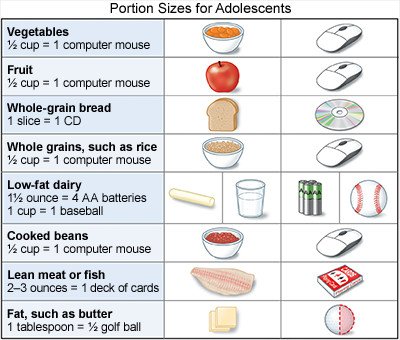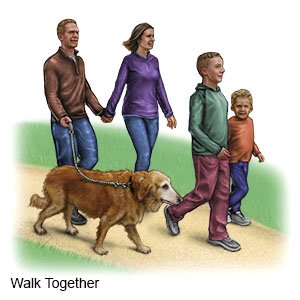Obesity in Adolescents
Medically reviewed by Drugs.com. Last updated on Aug 4, 2025.
What is obesity?
Obesity means your body mass index (BMI) is at or above the 95th percentile. BMI is your weight divided by height. The percentile compares your BMI with the BMIs of others your age. You are at greater risk for obesity if at least 1 of your parents has obesity. You can make changes now that will help you be healthy, active, and do the activities you enjoy more easily. These changes can also help you create healthy habits you can use for the rest of your life. Some changes might seem difficult at first. The more you stick with your plan, the easier it will become.
How can I be successful at losing weight?
- Set small, realistic goals. An example of a small goal is to eat a vegetable at every meal.
- Ask for support. Tell friends and family members about your goals. Ask a friend or family member to lose weight with you. You may also want to join a weight-loss support group.
- Track your daily calories and activity. Write down what you eat and drink. Also write down how many minutes of physical activity you do each day.
- Track your weekly weight. Weigh yourself in the morning, before you eat or drink anything but after you use the bathroom. Use the same scale, in the same place, and in similar clothing each time. Only weigh yourself 1 to 2 times each week, or as directed. You may become discouraged if you weigh yourself every day.
- Build healthy habits. Remove unhealthy foods and replace them with healthy options. Read food labels and use nutrition information to make healthy choices. Start a hobby or learn relaxation methods to help you manage stress and emotional eating.
How is obesity managed?
Even a small decrease in BMI can reduce the risk for many health problems. Your healthcare provider will work with you to set a weight-loss goal.
- Meet with other healthcare providers to help you start to make lifestyle changes. Counseling with providers such as a dietitian, physical therapist, and psychologist may help you change your nutrition and activity habits. You may meet with providers alone, or you may meet with your family. Family meetings may help everyone in your family understand how to support you.
- Lifestyle changes include making healthy food choices and getting regular physical activity.
- Other treatments may be suggested by your healthcare provider if you have medical problems caused by obesity. These treatments are used in addition to lifestyle changes to treat severe obesity. Medicine may be given to decrease the amount of fat your body absorbs from the food you eat.
What eating changes can I make?
 |
- Stick to a schedule of 3 meals a day and 1 or 2 healthy snacks. Meals and snacks should be 2 to 4 hours apart. Only drink water between meals.
- Eat dinner with your family as often as possible. Ask if you can help prepare meals. Limit fast food and restaurant meals because they are often high in calories. Try eating out once a week to begin. Then try every other week. Look at the calories of the meals you pick when you eat out. Choose meals that have the amount of calories that fit into your healthy eating plan. Your healthcare providers can teach you how to count the calories in restaurant meals if they are not listed on the menu. You may also be able to ask for the food to be cooked in healthy ways. Examples include baked instead of fried, or cooked without oil.

- Decrease portion sizes. Use small plates, no larger than 9 inches in diameter. Fill your plate half full of fruits and vegetables. You do not have to finish everything on your plate.

- Limit soda, sports drinks, and fruit juice. These sugary beverages are high in calories. Drink water or drinks that have little or no sugar.
- Pack healthy lunches. An example is a turkey sandwich on whole-wheat bread with an apple, baby carrots, and low-fat milk.
What activity changes can I make?
- Be active for 60 minutes most days of the week. Find sports or activities that are fun for you, such as cycling, swimming, or running. Go for a walk, go bowling, or skateboard.

- Try to limit screen time to 2 hours daily. Do not watch TV in your bedroom. Do not eat in front of a TV or computer. Turn off electronic devices at a set time each evening.
- Have a regular sleep schedule. Sleep schedules that are not consistent can affect your weight. Adolescents ages 13 to 17 need at least 7 hours of sleep every night.
When should I seek immediate care?
- You have a severe headache or vision problems.
- You have trouble breathing during physical activity.
When should I or my parent call my doctor?
- You feel depressed.
- You have signs of diabetes, such as being very hungry, very thirsty, and urinating often.
- You have severe pain in your upper abdomen.
- Your hips or knees hurt when you walk.
- You have questions or concerns about your condition or care.
Care Agreement
You have the right to help plan your care. Learn about your health condition and how it may be treated. Discuss treatment options with your healthcare providers to decide what care you want to receive. You always have the right to refuse treatment. The above information is an educational aid only. It is not intended as medical advice for individual conditions or treatments. Talk to your doctor, nurse or pharmacist before following any medical regimen to see if it is safe and effective for you.© Copyright Merative 2025 Information is for End User's use only and may not be sold, redistributed or otherwise used for commercial purposes.
Further information
Always consult your healthcare provider to ensure the information displayed on this page applies to your personal circumstances.
